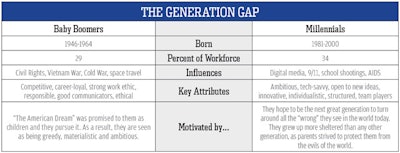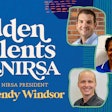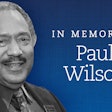We represent a boomer and a millennial working together. That's right — one of us with one foot out the door stereotyped as ambitious, greedy and materialistic, while the other is much earlier in their career and stereotyped as competitive, confident and ready to save the world. Despite these differences, we are an effective team, and believe it or not, this dynamic can be replicated. But all relationships take work, and there are a number of factors needed to make it possible. Effective teamwork comes from understanding each other's strengths and weaknesses, and utilizing your partner's skills and talents.
 Melissa M. Chew, CPRP is a project consultant with GreenPlay LLC and is based in Arizona. She has 36 years of experience in parks and recreation.
Melissa M. Chew, CPRP is a project consultant with GreenPlay LLC and is based in Arizona. She has 36 years of experience in parks and recreation.
Get to know each other
Sharing, talking and listening are important to build an effective, meaningful relationship. While sharing focuses mainly on work-related concepts, a certain amount of personal sharing can help build the relationship as well.
As traveling consultants, we spend much of our work time together. On trips, this can mean breakfast, client meetings, lunch, public meetings, debriefings, dinner and travel time over the course of multiple days. We have a lot of time to fill. While we aren't advocating that you blend your personal and professional lives beyond your comfort level (boundaries are appropriate), spending time together helps people get to know each other.
The point is that team members learn about and from each other: what each member values, what frustrates them, how they respond, what excites them. When team-building opportunities present themselves, members should participate. If opportunities don't come naturally, then creating them is important. Retreats, team-building, group lunches, etc., help provide chances to get to know each other better.
 Dylan Packebush, MBA, CPRP is a project consultant with GreenPlay LLC living in Denver.
Dylan Packebush, MBA, CPRP is a project consultant with GreenPlay LLC living in Denver.
Appreciate differences
We don't think alike. We don't act alike. Team members are different, and that dynamic should be appreciated and valued; it makes for a richer mix in our work experiences. In an effective relationship, people should affirm each other's strengths and cover each other's weaknesses. As members learn more about the other, they learn what each brings to the table. While leadership on a given project may vary from time to time, members should be tasked with the areas best- suited for their expertise and personality, which will not be the same in each instance.
There are many formal strategies for identifying personality types that can be helpful, but a certain degree of emotional intelligence can also assist in sharing traits and attributes of a particular "style." What's important to remember is that no style is right or wrong; each has advantages. Team members build each other up for the success of the whole team.
An extroverted boomer may find it easy to take charge and direct tasks. Meanwhile, a steadfast millennial offers the ability to look objectively and analyze. A team needs both skillsets.

Learn from each other
Knowing a team's strengths and weaknesses allows a team leader to focus on individual contributions. In his article titled Why Baby Boomers and Millennials Make Great Teams, Nathaniel Koloc says, "At the core of the millennial energy is potential and at the core of boomer energy is experience."
Millennials often bring excitement, energy and a new way of doing things that can make projects fun and exciting. Don't be afraid to try their new ideas and processes and, yes, even technology. Meanwhile, boomers bring years of experience to the table. Successes and failures have paved a lengthy path to help formulate who they are, where they are going and how they are going to get there. Don't be afraid to call upon that expertise.
More from AB: Blog: Bridging the Generation Gap in Your Recreation Center
A recent project required us to navigate a tricky scope of work and call upon our unique strengths to find a solution. As the project took unexpected twists and turns (deadline changes, political influences and passionately engaged community members, to name a few), it became clear that we would need to rely on each other to continue to move the project forward, provide stability to the planning process and ultimately provide a successful end product to the client.
Although we share the same title — project consultant — the boomer had far more recreation experience than the millennial, but had served less time within the consulting role. Meanwhile, the millennial had new approaches and ideas that deviated from "the way we've always done it." Our internal team meetings regularly included asking for the other's advice on potential recommendations, managing the project, managing the client and opportunities to vent frustrations with the process. To work through challenges together required a level of trust and a willingness to learn from each other.
Remain professional
The goal of any working relationship is to produce the best end result. Personal feelings and preconceived notions often get in the way. Focusing on outcomes helps all members of the team remain objective. While there will — and should — always be some disagreement within a team structure, it is part of the creative process and should be handled respectfully.
Millennials may come up with creative new ideas that need a boomer's experience to refine. Likewise, boomers may need new ways to problem-solve and communicate, and they may just find that a millennial has the solution. Often this starts with the self-recognition and humility to ask for help, and understanding that working together toward agreed-upon goals builds the team relationship. People want to feel like they've contributed real value to the team and its accomplishments, regardless of age category.
Celebrate success
Finally, don't forget to celebrate the success of building relationships and project milestones to which all team members (regardless of generation) contribute. This takes a conscious effort to pause and recognize individual and team successes. We often do this in the form of recognition publicly and privately, quarterly staff retreats and team dinners, among other activities.
These celebrations of success are beneficial both to the individual team members and the overall company. Recognizing success motivates team members to do more and drives employee satisfaction and happiness. These reflections also allow the entire team to better understand and replicate the processes contributing to success.
More from AB: Nineteen Rules for Dealing with Generation Y Employees
Boomers and millennials can make a great team. They both bring skills and attributes that make for fun and effective projects. The key is really about respecting each other enough to take the time to communicate and build a relationship so that skills and talents are utilized effectively and appropriately. But then, isn't that what all relationships are about?
WHY CELEBRATE SUCCESS?According to the team-building experts at BrilliantLivingHQ.com, celebrating success offers the following benefits: 1. To learn and adapt 2. Developing a success mindset 3. Motivation 4. Feeling good 5. Sharing success |
This article originally appeared in the June 2017 issue of Athletic Business with the title "Building a successful mixed-generation team" Athletic Business is a free magazine for professionals in the athletic, fitness and recreation industry. Click here to subscribe.






























